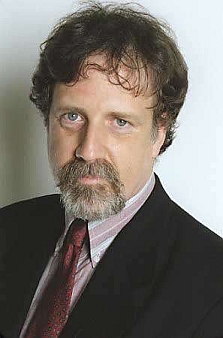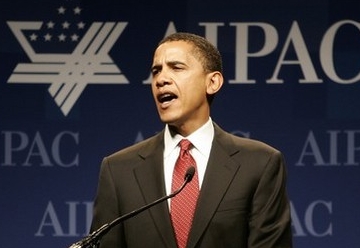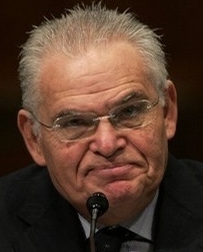Obama clarifies united Jerusalem comment
By Hilary Liela Krieger, Jerusalem Post, June 6, 2008
Presumptive Democratic presidential nominee Barack Obama did not rule out Palestinian sovereignty over parts of Jerusalem when he called for Israel’s capital to remain “undivided,” his campaign told The Jerusalem Post Thursday.
“Jerusalem will remain the capital of Israel, and it must remain undivided,” Obama declared Wednesday, to rousing applause from the 7,000-plus attendees at the American Israel Public Affairs Committee policy conference.
But a campaign adviser clarified Thursday that Obama believes “Jerusalem is a final status issue, which means it has to be negotiated between the two parties” as part of “an agreement that they both can live with.”
“Two principles should apply to any outcome,” which the adviser gave as: “Jerusalem remains Israel’s capital and it’s not going to be divided by barbed wire and checkpoints as it was in 1948-1967.”
He refused, however, to rule out other configurations, such as the city also serving as the capital of a Palestinian state or Palestinian sovereignty over Arab neighborhoods.
“Beyond those principles, all other aspects are for the two parties to agree at final status negotiations,” the Obama adviser said.
Many on the right of the political spectrum among America’s Jews welcomed Obama’s remarks at AIPAC, but the clarification of his position left several cold.
“The Orthodox Union is extremely disappointed in this revision of Senator Obama’s important statement about Jerusalem,” said Nathan Diament, director of public policy for the Union of Orthodox Jewish Congregations. He had sent out a release Wednesday applauding Obama’s Jerusalem remarks in front of AIPAC.
“In the current context, everyone understands that saying ‘Jerusalem… must remain undivided’ means that the holy city must remain unified under Israeli rule, as it has been since 1967,” Diament explained.
“If Senator Obama intended his remarks at AIPAC to be understood in this way, he said nothing that would reasonably lead to such a different interpretation.”
Morton Klein, president of the Zionist Organization of America and another Jewish activist who had originally lauded Obama’s statement, now called the candidate’s words “troubling.”
“It means he used the term inappropriately, possibly to mislead strong supporters of Israel that he supports something he doesn’t really believe,” Klein charged.
But congressman Robert Wexler, a Democrat from Florida with ties to the Jewish community and a long-time supporter of Obama, rejected the idea that the Illinois senator had been misleading with his comments.
“Everyone knows that Jerusalem is a final status issue. That is not a secret to anyone. Senator Obama says emphatically that should the Israelis and the Palestinians negotiate [an agreement], he will respect their conclusions and that he will not dictate a particular resolution.”
And some groups were pleased by the clarification on Jerusalem provided by the campaign.
“There was reaction from some of our base who were taken aback by it and thought he was undermining the peace process,” said Americans for Peace Now spokesman Ori Nir, who described his organization as “gratified” by the clarified position which seems to follow APN’s policy that sovereignty of Jerusalem could be shared in a final peace settlement.
Obama has faced questions about his support for Israel from hawkish quarters of the Jewish community, and his campaign said the speech before AIPAC, following a town hall meeting at a Florida synagogue last month, were key elements in shoring up the Jewish vote, which generally goes to the Democrats.
“We think we’ve gotten a good reaction to the speech and we’re pleased that we’ve gotten a good reaction,” said the campaign adviser of the candidate’s AIPAC address, which received multiple sustained standing ovations.
Palestinian factions though were particularly troubled by the original speech’s original language on an undivided Jerusalem.
“This statement is totally rejected,” said Palestinian Authority Chairman Mahmoud Abbas, whom a top aide described as “disappointed.”
“The whole world knows that holy Jerusalem was occupied in 1967 and we will not accept a Palestinian state without having Jerusalem as the capital of a Palestinian state,” Abbas said.
The Obama campaign adviser said that whatever the international reaction, it was important for the Illinois senator to “make his positions clear.”
“Our main audience is American voters at the moment. Other people want to know where he stands and it’s important that they do know where he stands,” he said.
Speaking generally about the speech, which also stressed the importance of a secure Israel and the need to isolate Hamas, Hamas official Sami Abu Zuhri told Reuters: “Obama’s comments have confirmed that there will be no change in the US administration’s foreign policy on the Arab-Israeli conflict.”
Prime Minister Ehud Olmert, however, called Obama’s address “moving,” adding that he was also impressed by the speeches delivered at the same conference by Democratic rival, Hillary Clinton, and presumptive Republican nominee, John McCain.
Olmert spoke to all three candidates by phone Thursday as he wrapped up a three-day visit to Washington. [complete article]
— The Washington Post said:
Obama quickly backtracked today in an interview with CNN.
“Well, obviously, it’s going to be up to the parties to negotiate a range of these issues. And Jerusalem will be part of those negotiations,” Obama said when asked whether Palestinians had no future claim to the city.
Obama said “as a practical matter, it would be very difficult to execute” a division of the city. “And I think that it is smart for us to — to work through a system in which everybody has access to the extraordinary religious sites in Old Jerusalem but that Israel has a legitimate claim on that city.”
That’s probably good enough to back him out of the cul-de-sac he drove into yesterday, but he would surely have been better off not using the word “undivided” in the first place. Anyone who has been concerned about whether Obama can be taken at his word, just got freely handed a reason to be “troubled.”

 The Wikipedia entry for New York Times reporter,
The Wikipedia entry for New York Times reporter,  rab leaders have reacted with anger and disbelief to an intensely pro-Israeli speech delivered by Barack Obama, the US Democratic presumptive presidential nominee.
rab leaders have reacted with anger and disbelief to an intensely pro-Israeli speech delivered by Barack Obama, the US Democratic presumptive presidential nominee. I interviewed five Islamic scholars, at five American universities, recommended by a variety of sources as experts in the field. All of them said that Luttwak’s interpretation of Islamic law was wrong.
I interviewed five Islamic scholars, at five American universities, recommended by a variety of sources as experts in the field. All of them said that Luttwak’s interpretation of Islamic law was wrong. A: The Center for Rural Strategies, a non-partisan think tank in Whitesburg, Kentucky, did a poll on October 26, 2006. When asked what was the top issue going into the midterm elections, 38 percent of the respondents said “lack of economic fairness”. There’s the message.
A: The Center for Rural Strategies, a non-partisan think tank in Whitesburg, Kentucky, did a poll on October 26, 2006. When asked what was the top issue going into the midterm elections, 38 percent of the respondents said “lack of economic fairness”. There’s the message.